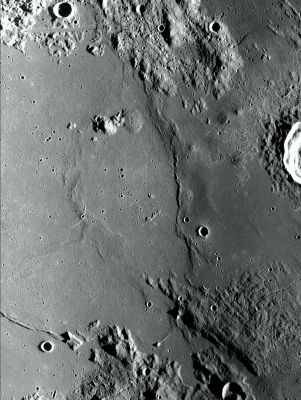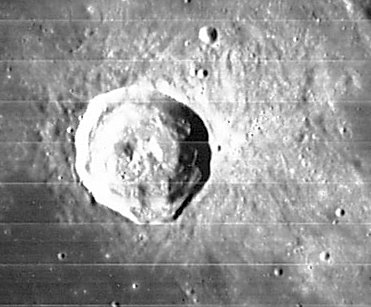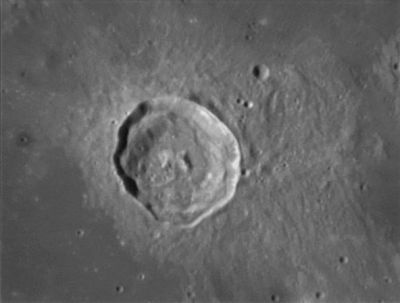Difference between revisions of "Manilius"
(Created page with "<div id="content_view" class="wiki" style="display: block"> =Manilius= {| class="wiki_table" | colspan="2" | Lat: 14.5°N, Long: 9.1°E, Diam: 38 km, Depth: 3.06 km, Rükl...") |
|||
| Line 3: | Line 3: | ||
{| class="wiki_table" | {| class="wiki_table" | ||
| colspan="2" | | | colspan="2" | | ||
| − | Lat: 14.5°N, Long: 9.1°E, Diam: 38 km, Depth: 3.06 km, Rükl: 23, [http://the-moon. | + | Lat: 14.5°N, Long: 9.1°E, Diam: 38 km, Depth: 3.06 km, Rükl: 23, [http://the-moon.us/wiki/Stratigraphy Eratosthenian]<br /> |
|- | |- | ||
| | | | ||
| Line 16: | Line 16: | ||
[http://www.lpod.org/coppermine/thumbnails.php?album=search&type=full&search=Manilius LPOD Photo Gallery] [http://www.lpi.usra.edu/resources/lunar_orbiter/bin/srch_nam.shtml?Manilius%7C0 Lunar Orbiter Images] [http://www.lpi.usra.edu/resources/apollo/search/feature/?feature=Manilius Apollo Images]<br /> <u>'''Warning'''</u>: several orbital photographs of '''Manilius''' and environs, made with Apollo 15's panoramic ''ITEK''-camera, are online in the LPI's ''Apollo Image Atlas'' as "[http://www.lpi.usra.edu/resources/apollo/search/feature/?feature=Manilus&sort= Manilus]" instead of '''Manilius'''. <span class="membersnap">- [http://www.wikispaces.com/user/view/DannyCaes [[Image:DannyCaes-lg.jpg|16px|DannyCaes]]] [http://www.wikispaces.com/user/view/DannyCaes DannyCaes] <small>Feb 17, 2012</small></span><br /> - Apollo 15's panoramic ''ITEK''-camera frame [http://www.lpi.usra.edu/resources/apollo/frame/?AS15-P-10169 AS15-P-10169] shows a close up of the unnamed dark halo crater immediately west of '''Manilius'''.<br /> Research: Danny Caes<br /> <br /> | [http://www.lpod.org/coppermine/thumbnails.php?album=search&type=full&search=Manilius LPOD Photo Gallery] [http://www.lpi.usra.edu/resources/lunar_orbiter/bin/srch_nam.shtml?Manilius%7C0 Lunar Orbiter Images] [http://www.lpi.usra.edu/resources/apollo/search/feature/?feature=Manilius Apollo Images]<br /> <u>'''Warning'''</u>: several orbital photographs of '''Manilius''' and environs, made with Apollo 15's panoramic ''ITEK''-camera, are online in the LPI's ''Apollo Image Atlas'' as "[http://www.lpi.usra.edu/resources/apollo/search/feature/?feature=Manilus&sort= Manilus]" instead of '''Manilius'''. <span class="membersnap">- [http://www.wikispaces.com/user/view/DannyCaes [[Image:DannyCaes-lg.jpg|16px|DannyCaes]]] [http://www.wikispaces.com/user/view/DannyCaes DannyCaes] <small>Feb 17, 2012</small></span><br /> - Apollo 15's panoramic ''ITEK''-camera frame [http://www.lpi.usra.edu/resources/apollo/frame/?AS15-P-10169 AS15-P-10169] shows a close up of the unnamed dark halo crater immediately west of '''Manilius'''.<br /> Research: Danny Caes<br /> <br /> | ||
==Maps== | ==Maps== | ||
| − | ''([http://the-moon. | + | ''([http://the-moon.us/wiki/LAC%20zone LAC zone] 59B2)'' [http://www.lpi.usra.edu/resources/mapcatalog/LAC/lac59/ LAC map] [http://www.lpi.usra.edu/resources/mapcatalog/usgs/I548/ Geologic map]<br /> <br /> |
==Description== | ==Description== | ||
<br /> | <br /> | ||
==Description: Elger== | ==Description: Elger== | ||
| − | ''([http://the-moon. | + | ''([http://the-moon.us/wiki/IAU%20Directions IAU Directions])'' MANILIUS.--This, one of the most brilliant objects in the first quadrant, is about 25 miles in diameter, with walls nearly 8000 feet above the floor, which includes a bright central mountain. The inner slope of the border on the W. is much terraced and contains some depressions. There is a small isolated bright mountain 2000 feet high on the [http://the-moon.us/wiki/Mare%20Vaporum Mare Vaporum], some distance to the W.<br /> <br /> |
==Description: Wikipedia== | ==Description: Wikipedia== | ||
[http://en.wikipedia.org/wiki/Manilius_%28crater%29 Manilius]<br /> <br /> | [http://en.wikipedia.org/wiki/Manilius_%28crater%29 Manilius]<br /> <br /> | ||
==Additional Information== | ==Additional Information== | ||
| − | * Depth data from [http://the-moon. | + | * Depth data from [http://the-moon.us/wiki/Kurt%20Fisher%20crater%20depths Kurt Fisher database] |
** Arthur, 1974: 3.06 km | ** Arthur, 1974: 3.06 km | ||
** Westfall, 2000: 3.06 km | ** Westfall, 2000: 3.06 km | ||
** Viscardy, 1985: 3.1 km | ** Viscardy, 1985: 3.1 km | ||
** Cherrington, 1969: 2.83 km | ** Cherrington, 1969: 2.83 km | ||
| − | * [http://the-moon. | + | * [http://the-moon.us/wiki/Central%20peak%20composition Central peak composition]: A ([http://the-moon.us/wiki/Tompkins%20%26%20Pieters%2C%201999 Tompkins & Pieters, 1999]) |
* A dark-halo craterlet slightly west of Manilius was captured on Hasselblad image [http://www.lpi.usra.edu/resources/apollo/frame/?AS15-93-12683 AS15-93-12683]. This dark-halo craterlet is a good test object for telescopic observers of the Full Moon. Research: Danny Caes. | * A dark-halo craterlet slightly west of Manilius was captured on Hasselblad image [http://www.lpi.usra.edu/resources/apollo/frame/?AS15-93-12683 AS15-93-12683]. This dark-halo craterlet is a good test object for telescopic observers of the Full Moon. Research: Danny Caes. | ||
| − | * Included in [http://the-moon. | + | * Included in [http://the-moon.us/wiki/ALPO%20list%20of%20bright%20ray%20craters ALPO list of bright ray craters] |
| − | * TSI = 30, CPI = 15, FI = 25; MI =70 [http://the-moon. | + | * TSI = 30, CPI = 15, FI = 25; MI =70 [http://the-moon.us/wiki/Smith%20and%20Sanchez%2C%201973 Smith and Sanchez, 1973] |
* '''Manilius domes''' in the region (a slice of '''Manilius''' crater is seen on right edge of image). | * '''Manilius domes''' in the region (a slice of '''Manilius''' crater is seen on right edge of image). | ||
** [http://www.lpod.org/coppermine/displayimage.php?pid=4786&fullsize=1 [[Image:normal_manilius-domes.jpg|external image normal_manilius-domes.jpg]]] | ** [http://www.lpod.org/coppermine/displayimage.php?pid=4786&fullsize=1 [[Image:normal_manilius-domes.jpg|external image normal_manilius-domes.jpg]]] | ||
| Line 46: | Line 46: | ||
* Named for [http://en.wikipedia.org/wiki/Marcus_Manilius Marcus Manilius] (fl. 1st century AD), a Roman poet, astrologer, and author of a poem in five books called ''Astronomica''. | * Named for [http://en.wikipedia.org/wiki/Marcus_Manilius Marcus Manilius] (fl. 1st century AD), a Roman poet, astrologer, and author of a poem in five books called ''Astronomica''. | ||
| − | * This name has continued unchanged since its original usage for this feature on [http://the-moon. | + | * This name has continued unchanged since its original usage for this feature on [http://the-moon.us/wiki/Riccioli Riccioli]'s map (''[http://the-moon.us/wiki/Whitaker Whitaker]'', p. 213). |
* An officially unnamed rille just south of Manilius is called '''''Rima Pau''''' by the dedicated moon observer K.C.Pau. | * An officially unnamed rille just south of Manilius is called '''''Rima Pau''''' by the dedicated moon observer K.C.Pau. | ||
<br /> | <br /> | ||
==LPOD Articles== | ==LPOD Articles== | ||
| − | [http:// | + | [http://www2.lpod.org/wiki/March_3,_2005 Rare Image of Common Crater]<br /> <br /> |
==Bibliography== | ==Bibliography== | ||
<br /> <br /> | <br /> <br /> | ||
---- | ---- | ||
This page has been edited 1 times. The last modification was made by <span class="membersnap">- [http://www.wikispaces.com/user/view/tychocrater [[Image:tychocrater-lg.jpg|16px|tychocrater]]] [http://www.wikispaces.com/user/view/tychocrater tychocrater]</span> on Jun 13, 2009 3:24 pm - ''afx3u2''</div> | This page has been edited 1 times. The last modification was made by <span class="membersnap">- [http://www.wikispaces.com/user/view/tychocrater [[Image:tychocrater-lg.jpg|16px|tychocrater]]] [http://www.wikispaces.com/user/view/tychocrater tychocrater]</span> on Jun 13, 2009 3:24 pm - ''afx3u2''</div> | ||
Revision as of 20:23, 11 April 2018
Contents
Manilius
|
Lat: 14.5°N, Long: 9.1°E, Diam: 38 km, Depth: 3.06 km, Rükl: 23, Eratosthenian | |
Table of Contents
Images
LPOD Photo Gallery Lunar Orbiter Images Apollo Images
Warning: several orbital photographs of Manilius and environs, made with Apollo 15's panoramic ITEK-camera, are online in the LPI's Apollo Image Atlas as "Manilus" instead of Manilius. - DannyCaes DannyCaes Feb 17, 2012
- Apollo 15's panoramic ITEK-camera frame AS15-P-10169 shows a close up of the unnamed dark halo crater immediately west of Manilius.
Research: Danny Caes
Maps
(LAC zone 59B2) LAC map Geologic map
Description
Description: Elger
(IAU Directions) MANILIUS.--This, one of the most brilliant objects in the first quadrant, is about 25 miles in diameter, with walls nearly 8000 feet above the floor, which includes a bright central mountain. The inner slope of the border on the W. is much terraced and contains some depressions. There is a small isolated bright mountain 2000 feet high on the Mare Vaporum, some distance to the W.
Description: Wikipedia
Additional Information
- Depth data from Kurt Fisher database
- Arthur, 1974: 3.06 km
- Westfall, 2000: 3.06 km
- Viscardy, 1985: 3.1 km
- Cherrington, 1969: 2.83 km
- Central peak composition: A (Tompkins & Pieters, 1999)
- A dark-halo craterlet slightly west of Manilius was captured on Hasselblad image AS15-93-12683. This dark-halo craterlet is a good test object for telescopic observers of the Full Moon. Research: Danny Caes.
- Included in ALPO list of bright ray craters
- TSI = 30, CPI = 15, FI = 25; MI =70 Smith and Sanchez, 1973
- Manilius domes in the region (a slice of Manilius crater is seen on right edge of image).

- LROC mosaic image from both WAC No. M116282898ME and WAC No. M116269338ME (unofficial image, stacked using the LROC_WAC_Previewer software - - JohnMoore2 JohnMoore2).
Manilius 1 and Manilius 2 (Irregular Mare Patches -IMPs- west of Manilius)
- Manilius 1 (number 30 in the catalog of 70 IMPs) is detectable at Latitude 14.889 / Longitude 6.467.
- Manilius 2 (number 37) is detectable at Latitude 14.628 / Longitude 6.821.
- Warning: both Manilius 1 and 2 are very small formations. The diameter of Manilius 1 is 270 meters, Manilius 2 is 200 meters.
Nomenclature
- Named for Marcus Manilius (fl. 1st century AD), a Roman poet, astrologer, and author of a poem in five books called Astronomica.
- This name has continued unchanged since its original usage for this feature on Riccioli's map (Whitaker, p. 213).
- An officially unnamed rille just south of Manilius is called Rima Pau by the dedicated moon observer K.C.Pau.
LPOD Articles
Bibliography
This page has been edited 1 times. The last modification was made by - tychocrater tychocrater on Jun 13, 2009 3:24 pm - afx3u2

